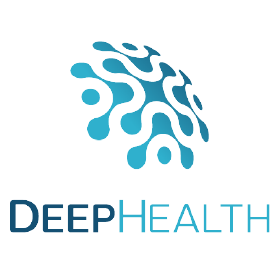Published on 28/01/2022

Deep-Learning and HPC to Boost Biomedical Applications for Health
In the context of automating and accelerating the analysis of the health data and processes, health scientific discovery and innovation are expected to quickly move forward under the so-called “fourth paradigm of science”, which relies on unifying the traditionally separated and heterogeneous high-performance computing and big data analytics environments. Under this paradigm, the DeepHealth project will provide HPC computing power at the service of biomedical applications; and apply Deep Learning (DL) techniques on large and complex biomedical datasets to support new and more efficient ways of diagnosis, monitoring and treatment of diseases.
Objectives
The aim of DeepHealth is to offer a unified framework completely adapted to exploit underlaying heterogeneous HPC and Big Data architectures; and assembled with state-of-the-art techniques in Deep Learning and Computer Vision. In particular, the DeepHealth framework is envisioned to tackle real needs of the health sector and facilitate the daily work of medical personnel and the expert users in terms of image processing and the use and training of predictive models without the need of combining numerous tools. To this end, the project will combine High-Performance Computing (HPC) infrastructures with Deep Learning (DL) and Artificial Intelligence (AI) techniques to support biomedical applications that require the analysis of large and complex biomedical datasets and thus, new and more efficient ways of diagnosis, monitoring and treatment of diseases. Moreover, two new libraries, the European Distributed Deep Learning Library (EDDLL) and the European Computer Vision Library (ECVL), will be developed and incorporated in the DeepHealth framework for manipulating and processing the images in a more efficient way and thus, for increasing the productivity of professionals working on biomedical images. The resulting enhanced diagnosis will significantly improve the health service provided to the society, making public health systems more efficient and profitable for everyone.
Use cases/verticals
DeepHealth framework will be validated by 7 existing biomedical software platforms which, in the context of 14 use cases, will be trained with data from different medical areas (migraine, dementia, depression, etc.) in order to create the respective models. In these use cases, Big Data and/ or image processing is needed for diagnosis or disease studies. The considered end-users of such a system are the doctors and other medical personnel that have the knowledge to label images and provide metadata in relation to the images. The expert users, typically computer scientists or engineers that act as service providers for the end users, are in charge of processing the images provided by them, mainly for training predictive models. These models are accordingly used by the medical personnel (end users) through the software platforms in order to get insights and support them in the diagnosis.
WINGS involvement
WINGS serves in this project as a use case and platform owner. In this context, MigraineNet mobile application and Cloud platform will be adjusted and integrated with the DeepHealth platform and its libraries so as to take advantage of the HPC setting and the parallelization technologies and thus, reduce significantly the training and the evaluation times of the migraine predictions offered through the platform. This will also enhance the scalability of the MigraineNet system in terms of quickly processing data and developing/training and evaluating the prediction models simultaneously for more migraineurs. Moreover, in DeepHealth and in the context of “Migraines and Seizures predictions” use case, WINGS will consider the extension of the system capabilities to include more health issues than migraine, e.g., seizures.
WINGS prospects /exploitation
Participating in DeepHealth will allow WINGS to enhance its platform (MigraineNet) in terms of time-requirements, resources and scalability. Moreover, it will allow its expansion in more health aspects such as seizures treatment. Thus, it will allow WINGS to extend its solutions portfolio, enhance and adapt its suite of software tools and APIs intelligence for cloud-based e-health applications and services as well as include new e-health services and consultancy to major relevant stakeholders and 3rd party developers. In the mid-term, it will assist in pursuing product-oriented strategies in conjunction with its partners. The obtained know-how and developed software will be further contributed to forthcoming projects and research and development activities. Last but not least, given its experience in patents, WINGS is also willing to collaborate with consortium partners towards this direction as well.
Awards & demonstration video
TBA
Website: https://deephealth-project.eu/
Framework: H2020
Duration: 01.2019-12.2021
![]() This project has received funding from the Horizon 2020 programme under grant agreement No 825111
This project has received funding from the Horizon 2020 programme under grant agreement No 825111

